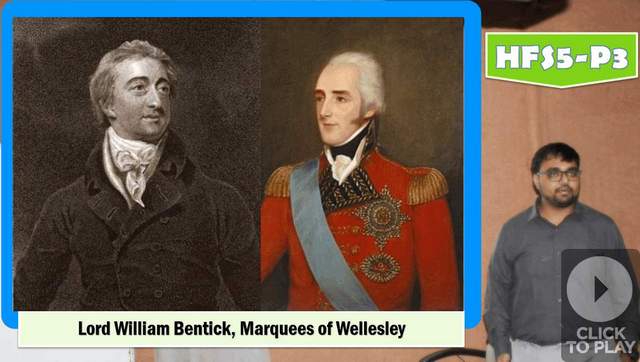- Prologue
- HFS5/P1: Stages of Colonization in India
- HFS5/P2: Governors East India Company: Clive to Cornwallis
- HFS5/P3: Governor-General William Bentick & Wellesly
- HFS5/P4: Governor-General Dalhousie- the maker of Modern India
- HFS5/P5: Railways- Development & Role in British Empire
Prologue
- So far in his history-freedom struggle lecture series, Mr.Pratik Nayak covered the entry and establishment of the British in India, their treaties and alliances and development of press, modern education and civil services in India; their land revenue policy and drain of wealth from India.
- Now the topic progresses further to the role of Governor Generals and Railways in establishment of British rule over India.
- Powerpoints available @Mrunal.org/download
HFS5/P1: Stages of Colonization in India
- Recap of the previous lectures
- Phase I: Mercantile Phase 1757-1813: monopoly in trade and plunder, elimination of native rulers and rival European powers
- Phase II: Industrial Phase 1813-1860 : industrial revolution, capitalism, East India company
- Phase III: Financial Phase 1860-1947: promoting foreign investment in railways, plantations, coal mining and shipping.
- Previous multiple choice questions (MCQ) in UPSC prelims exam from this topic.
Youtube Link: https://youtu.be/0V2ngKvZpXI
HFS5/P2: Governors East India Company: Clive to Cornwallis
- Robert Clive the first governor: his role in expansion of East India company (EIC) in India
- Gov generals of Bengal under the regulating act of 1773
- Gov general Warren Hastings (1774 to 1785): administrative, revenue and legislative reforms, reorganization of the judicial system – Sadar Diwani Adalat and Sadar Nizamat Adalat
- introduction of English Collectors and accountant General in India
- Lord Cornwallis: 1786 to 1793 – reforms in administrative, revenue and legislation. Third Mysore war, Treaty of Srirangapattinam; foundation of merit-based Indian civil service
- separation of three branches of service – commercial, judicial and revenue
- Cornwallis code and separation of powers; District Judge and police reforms
- Previous multiple choice questions (MCQ) in UPSC prelims exam from this topic.
Youtube Link: https://youtu.be/t0fOc5KGJUc
HFS5/P3: Governor-General William Bentick & Wellesly
- Marquees of Wellesly: subsidiary alliance system, fourth Anglo Mysore war, second, establishment of British Paramountcy in India
- Lord Hastings (1813 to 1823): forward policy, wars against Pindari, Maratha, War against Gurkha and Treaty of Sagauli,
- Lord William Bentinck (1828 to 1835): Charter act of 1833, non-intervention in nonaggression with Indian states, financial reforms, introduction of local languages in the lower courts, abolition of Sati, Thugs and female infanticide; Setting up of Macaulay committee, Calcutta Medical College.
- Lord Auckland, Lord Ellenborough and Afghan wars.
- Previous multiple choice questions (MCQ) in UPSC prelims exam from this topic.
Youtube Link: https://youtu.be/WHyFhmCQ6fM
HFS5/P4: Governor-General Dalhousie- the maker of Modern India
- Lord Dalhosie- the maker of modern India (1848 to 56)- policy of annexation, doctrine of lapse, reforms in railways, telegram of postal, education and Public Works Department (PWD)
- post office act 1854, introduction of postage stamps
- educational reforms – Charles Wood’s dispatch 1854 and the foundation of modern education in India; Establishment of the universities at Bombay, Madras, Calcutta
- inclusion of martial tribes in Military.
- PWD: construction of Ganges Canal
Youtube Link: https://youtu.be/BJ9JleGE7S0
HFS5/P5: Railways- Development & Role in British Empire
- how did the railways serve expansion of British Empire in India?
- Drain of wealth from India through railways
- famines and food security
- positive impacts of Railways on India – in trade and commerce, transportation of people, building nationalist feelings, employment opportunities and challenges to Orthodoxy and social customs
- Previous multiple choice questions (MCQ) in UPSC prelims exam from this topic.
Youtube Link: https://youtu.be/rlX_IqbevfQ
Visit youtube.com/user/TheMrunalPatel for more lectures on various topics of General studies for UPSC civil services IAS/IPS Exam.






![[Summary] Budget & Economic Survey 2018 Gist for the UPSC IAS/IPS Interviews](https://mrunal.org/wp-content/uploads/2018/02/c-bes18-basanti-500x383.jpg)
![[BES171] Banking-Classification: Wholesale Banks, Cooperative Banks, DFI AIFI, MUDRA Bank, Islamic Bank, NBFCs & Indigenous Moneylenders](https://mrunal.org/wp-content/uploads/2017/05/c-bes171-evo-2-500x383.gif)
![[BES171] Banking-Classification: RBI Structure Functions, Nationalization, Scheduled Banks, Merger of SBI Associate Banks & BMB, Private Banks, SFB & Payment Banks](https://mrunal.org/wp-content/uploads/2017/02/c-bes171-cover-500x383.gif)
thanks sir ………for the lectures……………….u r doing a fabulous job……………………
Thanks sir, good lecture, How many more Lecture u are going to take?
a lecture on economic survey please…
nd article on imp. current issues….
Thanks a ton Sir For such guidance.
Thanks sir for video, How many more Lecture u are going to take?
Thanks a lot for this videos Sir. I had one question. Will you upload this year’s Economy lecture? Or Atleast PPT.
Thank You Sir…
Pleease upload the Missing Lecture on Modern Education .
Pls…Pls..
thanks sir :)
sir u r doing much than HRD ministry for youths like us from small towns
thank u for the lectures mrunal sir..
but plss plsss upload the missing lecture too… plsssplsss…
Sir, will we not get your new lectures this year?????????????????
million dollar work sir … thank you so much \,,/
Dear Pratik sir,
Thank you so much for your time.
Hope you will finish the syllabus of your part before prelims.
thanks again sir!!
Sir plz give me a link whr i can dwnld ur lecture… plz
Thnk u..
Thanks…
Mrunal sir,
pls provide economics lec. series of yours..
Eagerly waiting..
thx sir ji
polity ke lectr bhi post kardo sir dahi kripa hojayegi aapki mrunal sir
sahi bol raha hai bhai…
Will u nt provide lecturs 4 econmic survy sirr…..?? Plz do eagerly awting sirr..!!
Sir, best teaching method,plz post previous lec also
thanks sir for wonderful lectures….
u r doing a great job @mrunal Sir!
thank you sir
for your valuable class and easy way for understanding of history….
Modern histoty
sir..HFS5 P1-5 IS NOT AVAILABLE IN DOWNLOAD SECTION…ONLY UPTO HFS4 IS AVAILABLE..PLS UPLOAD
Respected sir please provide me information about upsc cpf 2016. How to prepare it.